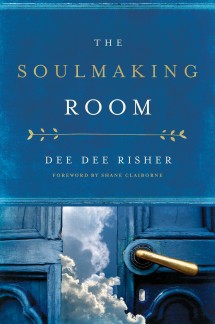 Dee Dee Risher’s The Soulmaking Room is a lovely, sometimes poetic, blend of personal messages and global imperatives, all framed within the Bible story of the prophet Elisha and the Shunammite woman.
Dee Dee Risher’s The Soulmaking Room is a lovely, sometimes poetic, blend of personal messages and global imperatives, all framed within the Bible story of the prophet Elisha and the Shunammite woman.
In that story, a prominent woman offers hospitality to Elisha, who often stops at her home for food. The woman fixes a small room upstairs in her home with a bed, table, chair and lampstand so Elisha can have a place to sleep when he passes through.
When Elisha asks her what he can do for her in return, she says, “I live among my own people.” As Risher writes, those six words convey a greater meaning: “I am already blessed. I have enough. No, holy man, I need nothing from you.”
The rest of the Bible story conveys themes of death, accountability, and gratitude—in short, the universal threads central to life itself, with all its loss and resurrection.
But it’s the room—the room that the Shunammite woman prepared for Elisha—that Risher uses as the theme of her book. How can we bring the metaphor of that space into our contemporary and seemingly complicated lives? How do we create an inner space in which to grieve, to ask deep questions, to reflect on the joys and lessons of our journey? How do we prepare a space for all that is holy and sacred in our lives?
In short, how can each of us create our own soulmaking room?
The book prompted me to pause and consider that question, playing with both a literal and symbolic representation of my “room.” How would I outfit it? What would it look like? How would it be furnished?
To answer those questions, I went back to Risher’s book and found some of the many passages I’d highlighted.
Here, based on those quotes from the book (shown in bold), are thoughts about how I want to prepare my room. My hope is that they’ll prompt a similar thought process for you.
“Who are my people?” Risher writes. “The work of becoming the person I was created to be began with that single question; yet answering it has taken decades.” That statement gives me my first clues about outfitting my soulmaking room. I’ll equip it with our family tree and all the stories I can remember of those who came before me—people I’ve never met but whose DNA still lives on within me. I’ll also draw up a new tree of life, filling in the names of people who are not my blood relations, yet with whom I feel friendship, kinship and ease. And I’ll reserve spaces—sometimes reluctantly at first—for those who challenge me, urging me to shed the layers that keep me trapped in a false self.
“We can be taught about God, but ultimately we must seek the experience of God.” This infers that my soulmaking room will have doors through which I can come and go, experiencing God through relationship with others as well as myself. And for those quiet moments of solitude when I return to the room with new questions, I’ll have paper and pen handy so I can engage God in conversation and write out the responses from our dialogues.
“We are all pieces of creation, of clay, into which we are asked to breathe life. It is ours to work that clay.” Ah. So my room needs raw material—not only slabs of clay, but paints and canvases for painting. Seeds for planting. Old, time-worn beliefs that were never very serviceable but can be shaped into something extraordinary. And there will be places to play, to experiment, to start over, to recycle, so nothing is ever wasted or lost.
“Sometimes our hope is as small as one light burning in the great night.” A lantern, a candle, a hole in the roof through which the stars and moon shine in. My soulmaking room will always be rich with sources of light.
“The spiritual growth that comes with confronting and releasing loss is ultimately a more powerful testimony than a life in which there is no such loss.” There will be a special place for grief and sadness in my soulmaking room. It will not be at the center altar, which is reserved for joy. But it will be marked by an urn filled with rose petals, to be strewn throughout the room whenever I feel a deep sense of loss and need reminders of the beauty within it.
“…if we continually insist on being the host—the dispenser of hospitality—we essentially cling to privilege and ignore the gifts of others.” In addition to drawers for gift wrap, boxes and ribbon, my soulmaking room will include a gallery wall to display the gifts I receive, honoring others and the mutual exchange that, as Risher beautifully explains, is part of true relationship.
“We only begin to know ourselves by crossing borders. We learn who we are by becoming other, by being a stranger.” In my soulmaking room, then, I want a table and chairs where I can invite the Other to come sit and talk. I hope to intentionally seek out those who I might not consider “my people” so I can find common ground. And at the threshold to my room will be a mat with the word “Welcome” in different languages. Far from a doormat, which is passive and speaks of unworthiness, the Welcome mat will greet visitors with an energy that is active, intentional and alive.
“The word repent—teshuva—means ‘to turn,’ so as to aim the arrow true to the mark.” Risher explains this in language that makes sense to me: “No big wrong or huge mistake. There is nothing that cannot be redeemed. Instead, I often whisper to myself, ‘This path isn’t working. Sit still. Think creatively.'” In other words, there are no unforgivable sins. No flogging or shunning. In my soulmaking room, I’ll mark the four directions with banners of gold so I can gently turn and start on a new path as I listen to Spirit and redirect my thinking.
These are just a few of the countless points Risher makes that could be used to equip your soulmaking room. Like the Shunammite woman, we are each blessed, and yet Risher’s book gives us important ways to create more space for those blessings. By preparing our room—and then dwelling there—we may experience our lives with a depth and clarity we’ve not had before.
“I wrote this book to come home,” Risher says. May your soulmaking room help you make the same priceless journey.
Debra Engle is the author of The Only Little Prayer You Need. You can find her on Facebook and at debraengle.com.












